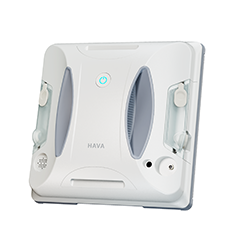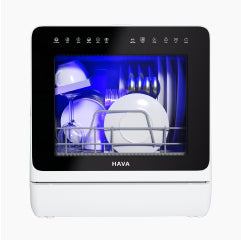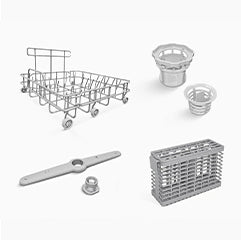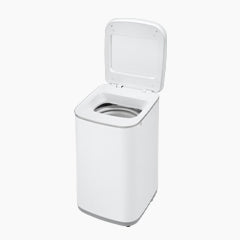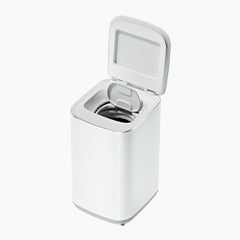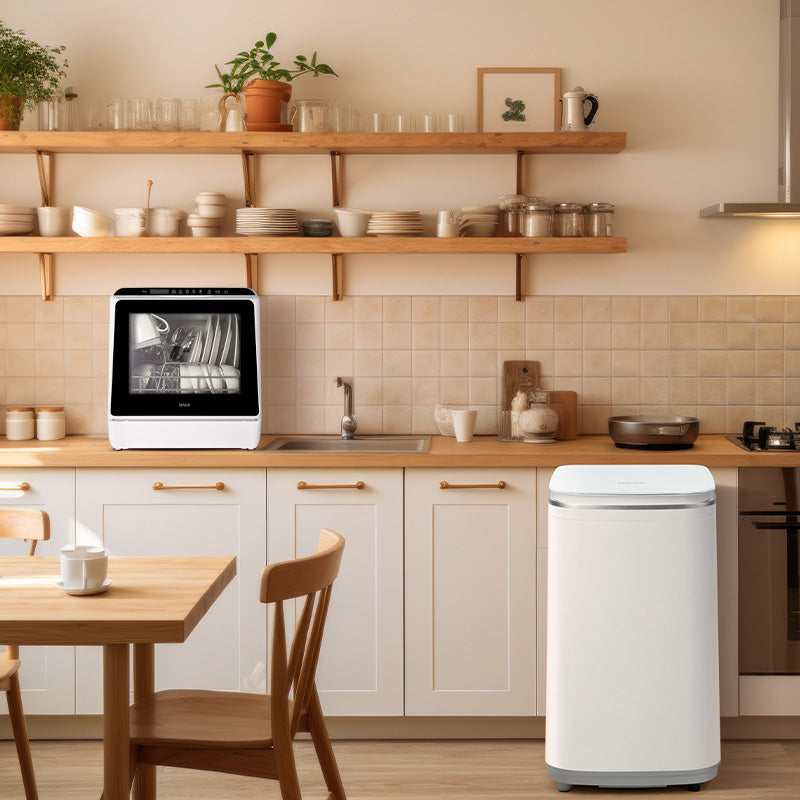Conserving water is necessary for the sustainability of the environment and more savings on water bills. Nowadays, we consciously reduce our water consumption when taking baths or watering the lawn, but what about water consumption when using dishwashers? Do you know how much water does a dishwasher use?
The quantity of water used by a dishwasher per cycle depends on the age and efficiency of the dishwasher. It also depends on if the dishwasher is energy-star rated or not. However, dishwashers manufactured after May 30, 2013, do not use more than 5 gallons of water per wash cycle. Energy star-rated dishwashers manufactured within the same timeframe do not use more than 3.5 gallons per cycle.
So, what other factors impact water usage? Using a dishwasher for dishes or hand washing, which is more water-efficient? Keep reading to find out.
Part 1. How Much Water a Dishwasher Uses
The quantity of water used by a dishwasher per cycle is dependent on a couple of factors. Chiefly, its efficiency and age. Older model dishwashers manufactured before 1994 use more than 10 to 15 gallons of water per wash cycle.
Now, on average, a standard dishwasher uses 4.2 gallons of water per wash cycle, while compact dishwashers, on the other hand, consume 3.5 gallons per cycle.
This low water consumption rate is due to the standards established in 2013. This standard requires dishwashers to use a maximum of 5 L of water per wash cycle.
This rate further reduces if the dishwasher is energy-star rated. The maximum quantity of water used by standard-sized dishwashers under this category is 3.5 gallons. On the other hand, compact dishwashers use 3.1 gallons of water per wash cycle.

Part 2. 5 Factors Impacting Water Usage
Water is a precious natural resource, and consuming it at a high rate puts the environment and its inhabitants at risk. True, the improved dishwashers have good water efficiency, but misusing them could also lead to the waste of this precious resource. Below are factors that determine the quantity of water a dishwasher uses.`
The Dishwasher Age
The dishwasher's age plays a huge role in determining how much water a dishwasher uses. Older models are more wasteful than newer ones. The new model dishwashers consider the environment and are infinitely more water-efficient than older models.
The Size and Condition of Your Machine
Another factor that determines the average water usage of your dishwasher is its size. The bigger the machine, the more water it consumes. In other words, larger machines consume more water than smaller or compact ones.
Also, if your machine has leaks and other technical problems, it would run inefficiently, consuming more water than necessary.
The Cycle Mode of Your Dishwasher
Most dishwashers have different wash cycles or programs for various dishes and situations. It is important to note that all cycles do not have the same level of water consumption. Some cycles are more water-efficient than orders. Cycles like high-temperature, heated-drying, or sanitizing task the dishwasher more, thereby using more water for the dishwashing process.
Pre-Rinsing Dishes
Some people opt to rinse their dishes with running water before putting them in the dishwasher. Doing this would ultimately lead to more water consumption, as you use more water than necessary.
Degree of Dirt on Dishes
The amount of dirt on dishes also determines how much water you consume. Opting for longer wash cycles is normal if your dishes are very dirty. Longer wash cycles lead to more water consumption.

Part 3. The Recommended Compact Countertop Dishwasher with Less Water Usage
True, newer generation dishwashers are water-efficient. However, some brands are more energy-efficient than others. Our top pick for water efficiency is the HAVA countertop dishwasher, and here's why below.
HAVA Countertop Dishwasher – Low Water Consumption
The HAVA compact countertop dishwasher is one of the best dishwashers in the market, being one of the Amazon best sellers in 2021. This dishwasher comes with impressive features, including a built-in water tank. This 5 L water tank helps you manage water efficiently. With this brand, you could also opt for a direct connection to a water faucet.
Being a countertop dishwasher takes minimal space in the kitchen, allowing you more space for other equipment. While compact, this dishwasher accommodates 2 place settings with standard-sized dishes when loaded at an angle. Its spacious interior fitted with upper and lower spray arms make it ideal for all-round dishwashing, ensuring your dishes come out squeaky clean.
There are five wash cycles and programs in this dishwasher; Speed, Normal, Soft, Baby Care/Heavy, and Fruit. It also has a dry mode feature, which helps dry your dishes as fast as possible while eliminating those streak lines often present in dishes that dry slowly. These washer programs cater to your washing needs while ensuring minimal water consumption. You consume 75% less water when using the HAVA countertop dishwasher than when you wash with your hand.
This dishwasher is also not selective in detergent. This means you can use any detergent with this dishwasher without fear of damage. It also comes with racks and a cutlery basket which makes for easy organization of dishes within the dishwasher. These racks could also serve as storage spaces, helping rid small kitchens of clutter, often caused by dirty dishes.
The HAVA compact countertop dishwasher features a dual-layer glass door for easy supervision of the washing process and LED light for illumination in low-light areas.

Part 4. Dishwasher vs Hand Washing
This debate has been going on for a long time. Some people favor the dishwasher, while others prefer washing dishes with their hands. So, which of them is better? Which do you prefer? We would dabble into this debate using a few points, after which we let you decide which you prefer.
Do Dishwashers Use Less Water Than Hand Washing?
Yes, according to reports, a standard dishwasher uses approximately 9.5 liters of water per wash. On the other hand, washing the same quantity of dishes with your hand uses over 60 liters. When you use a dishwasher, you save a huge 85 percent of water than washing the dishes with your hand.
You also save water when you stop pre-rinsing your dishes before sticking them in your dishwasher. A report shows that when you do this, you waste over 6,000 gallons of water every year. We know you are trying to extend the life of your dishwasher, but pre-rinse is unnecessary since new dishwashers like the HAVA can handle bits of food like a pro.
Here is the bigger picture, if you wash your dishes consistently using a dishwasher for one year, you will save up to 18,000 liters of water.
Are Dishwashers More Energy Efficient Than Hand Washing?
When you hand wash, you are not using energy and therefore not damaging the environment. However, this is not always true. When you wash dishes by hand using water heated through coal-based electricity, your actions negatively impact the environment.
However, the new generation dishwashers come with heaters that help increase the temperature of the water. These heaters also do this more efficiently than your conventional water heater.
Which Cleans Better – The Dishwasher or Washing by Hand?
We all agree that heat helps sterilize objects, ridding them of dirt and micro-organisms. Most dishwashers wash dishes at a temperature of around 50 degrees Celsius. At this temperature, water is too hot to handle. Combining this temperature with a good dishwasher detergent would leave your dishes looking squeaky clean, and sterile. It is better than what you would get when washing by your hands.

How Much Does It Cost To Use A Dishwasher Every Day Vs Hand Washing Dishes?
It is more energy and water efficient to wash dishes using a dishwasher than to wash by hand. In the long run, this also translates to cost, which makes dishwashing using a dishwasher more cost-effective.
Is Hand Washing Useless?
No, although a dishwasher is more water and energy-efficient, this is only when you have a fully loaded dishwasher. When it is not fully loaded, hand washing is ideal.
So when do you wash your dishes by hand? If you are in a small household, it would be impractical to wait for the dishwasher to fill before washing. You should also wash by hand if you have a few dirty plates to wash.
Also, when you consider other kitchen utensils you cannot wash with a dishwasher, including; chopping boards, chef knives, non-stick pans, and other heavy-duty utensils, you would know hand washing would always have its place.

Part 5. How To Reduce Dishwasher Water Usage
A dishwasher is a good machine for washing dishes because of its water and energy efficiency. However, misusing it could also result in the waste of water resources. So how do you reduce water consumption when using the dishwasher?
Upgrade to A More Energy and Water-Efficient Model
One way to guarantee a reduction in water usage is by using a dishwasher with a rating for energy and water efficiency like the HAVA compact countertop dishwasher. Dishwashers with this rating or remarks use very little water during washing compared to others without this rating.
Make Sure the Dishwasher's Fully Loaded
Before running your dishwasher, ensure that it is at maximum capacity. This would help make optimal use of water, energy, and detergent available. Turning on the dishwasher at half-load is not advisable because it would use less water and energy than a full load, it would always use more than half of what a full load would use.
Don't Load Almost-Clean Dishes
Load only dirty dishes in the dishwasher. Loading up your dishwasher with almost-clean dishes would waste water and energy since the dishwasher would expend the same amount of both resources on the dishes. Also, if a dish is heavily soiled, you can presoak it in a bowl of water before putting it in a dishwasher. This is better than rinsing it under the tap.
Use the Economy or Energy-Save Program
Washing dishes using this program is advisable since it helps save water and energy. This program washes dishes at about 50 degrees Celsius and uses approximately 3 Liters of water. If you cannot find this program on your dishwasher, look out for the Low water or quick wash cycle.
Keep Your Dishwasher in Good Condition
To ensure your dishwasher keeps working efficiently, endeavor to keep it in good condition. Ensure you read the user manual and manufacturer instructions that come with the machine before using it. This would help you understand how to use and maintain the machine properly.

Conclusion
An old model or less non-energy-efficient dishwasher uses a lot less water. However, the amount of water a dishwasher uses is dependent on its age and water efficiency. Older models use more due to their less efficiency, while a new model's average dishwasher uses less than 5 gallons of water per wash cycle. Washing your dishes consistently with a dishwasher saves 18,000 liters of water yearly, and avoiding pre-rinse saves 6,000 liters yearly.
